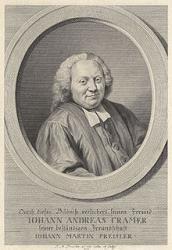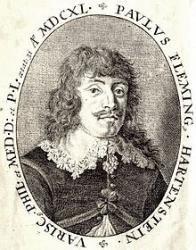
1666 - 1714 Hymnal Number: 443 Author of "Würdigster Jesus, Ehrenkönig" in Die Glaubensharfe Arnold, Gottfried, son of Gottfried Arnold, sixth master of the Town School of Annaberg in the Saxon Harz, born at Annaberg Sept. 5, 1666. His life was varied and eventful, and although much of it had little to do with hymnody from an English point of view, yet his position in German Hymnology is such as to necessitate an extended notice, which, through pressure of space, must be (typographically) compressed.
After passing through the Town School and the Gymnasium at Gera, he matriculated in 1685 at the University of Wittenberg—where he found the strictest Lutheran orthodoxy in doctrine combined with the loosest of living. Preserved by his enthusiasm for study from the grosser vices of his fellows, turning to contemplate the lives of the first Christians, he began those investigations in Church History on which his fame principally rests, and thought of preparing himself to become a lecturer and professor, the worldly spirit which pervaded the Church repelling him from seeking to become one of her ministers. Accepting in 1689 an appointment as family tutor at Dresden, he became a disciple of Spener, then Court Preacher. Seeing and testifying against the ill-living of those around him, he lost his appointment in 1693, but by Spener's recommendation obtained a similar post at Quedlinburg, the centre of a recent religious Revival, one of the leaders in which was the Senior Court diaconus, J. H. Sprogel. While at Quedlinburg he wrote and pub. his first work of importance: The First Love, i.e., a true Picture of the First Christians in their Living Faith, and Holy Life, 1696, a book glowing with faith and earnestness, which gained a rapid circulation (5th ed. 1727) and was very greatly valued by P. J. Spener. Being thus brought into notice he was in 1697 appointed by the Landgrave Ernst Ludwig of Hesse-Darmstadt as Professor of History at Giessen. Accepting the post in a hopeful spirit, he did not find himself at home in his surroundings, and, unable to work as he wished, was constrained to resign in 1698. Returning to Quedlinburg he found leisure in the house of his friend SprSgel to pursue the investigations for his Unparteiische Kirchen- und Ketzer-Historie (Frankfurt-am-Main, 1699-1700). This epoch-making work, the most important of all his publications, a monument of gigantic industry and based on the original sources, sought with impartiality to bring out clearly the most prominent and most beautiful features of the Church life of bygone ages, while the more important works that preceded it had been largely partisan. It was dedicated to the King of Prussia, who, Jan., 1702, named him Historiographer; it gained for him the King's help, but by the favourable views taken of the heretics, and the unfavourable light in which the action of the Church towards them was often regarded, a storm of indignation was raised against him throughout the Church. About this time he joined the "New Angel Brotherhood " (S. Matt. xxii. 30), of the followers of the mystic Jakob Bohine, wrote in 1700 his Mystery of the Wisdom of God (see below), in which Heavenly Wisdom was represented as a pure Virgin, union with whom would preclude any earthly marriage, and ceased to partake of Holy Communion in public. Thereupon the ecclesiastical authorities took action, and would have banished him from Quedlinburg had not the King of Prussia interfered and sent two commissions in 1700 and 1701 on Arnold's behalf. Now came the turning point in his life. A thief who had broken into the house of the Sprogels was appre¬hended at Allstedt, about 40 miles south. To bring the thief to justice, Sprogel's wife and her youngest daughter, Anna Maria, went thither under Arnold's care. Preaching before the widowed Duchess of Sachsen-Eisenach, Arnold was summoned by her to become preacher at her Court at Allstedt, and before entering on his duties was, on Sept. 5, 1701, married in Church at Quedlinburg to Anna Maria Sprogel—a union productive of the happiest results, and which in great measure cured him of his Separatist tendencies, but which brought the ridicule of his enemies upon him, and caused his expulsion from the Angel Brotherhood. Entering upon his duties at Allstedt in 1702, he encountered much opposition, and thus, in 1705, gladly accepted from the King of Prussia an appointment as pastor and inspector of Werben in the Altmark (near the junction of the Elbe and Havel), as successor to his father-in-law, who had removed thence from Quedlinburg. As his persecutors gave him no rest, he accepted from the magistrates of Perleberg, a few miles farther north, the pastorate there, to which the King added the inspectorate of the district, beginning his labours on the 22nd Sunday after Trinity, 1707, by a sermon on St. Matt, xiii. 45. Unwearied in word and work, by preaching, by household visitation, and by the composition of devotional manuals (one of which, entitled Paradiesischer Lustgarten, 1709, reached a 7th ed. in 1746), he sought the good of his flock and won universal love and esteem. His excessive devotion to study (publishing no less than 58 works, some being folios, within 20 years) and his sedentary habits, brought on a severe attack of scurvy. On Whit-Sunday, 1714, when barely recovered from his illness, a recruiting party burst into the church and impressed some of the young men who were in the act of receiving Holy Communion. This outrage was his death-blow. On the next day, May 21, as pre-arranged, he preached a funeral sermon, but had to be supported by the sexton to enable him to finish it, ' like a faithful soldier keeping his post till bis last gasp." Three days he lay in an armchair, and was then removed to bed. In earnest exhortation to his friends to full renunciation of self and of the world and complete dedication to God, in peaceful communion with God not unmingled with the bitterness of an early end, the days passed, till on May 30, 1714, after he had raised himself in bed and exclaimed "Frisch auf, frisch auf! Die Wagen her und fort," his spirit peacefully passed away, his mortal body being consigned to the grave on June 1—accompanied by a weeping multitude comprising nearly all the inhabitants of the place.
As a poet Arnold holds a high place, though but few of his hymns (mostly written at Quedlinburg) are entirely fitted for use in public worship. Ehmann characterises his poems as full of originality, as pervaded with a deep zeal for sanctification and the fear of God, and with glowing devotion and intensity of love for Christ. All are tinged, some very deeply, with his mysticism, dealing largely in theosophic language with the marriage of the soul to God. They found admission into the hymn-books of the Separatists and the Pietists, and many of them in modern times are included in Knapp's Ev. L. S. They appeared in the following works:—
(1) Gottliche Liebes-Funcken. Aus dem grossen Feuer der Liebt Gottes in Christo Jesu entsprungen. Frankfurt am Main, 1698. Containing 145 pieces, including his best hymns. (2) Anderer Theil der gottlichen Liebes-Funcken. Frankfurt, 1701. 36 pieces. (3) Das Geheimniss der gottlidien Sophia, der Weisheit, beschrieben und besungen. Leipzig, 1700. The poetical portion of this work is in two parts:—i. Poetische Lob- und Liebes-Spriiche (100); ii. Neue gottlicJie Liebes Funcken (133). (4) Das eheliche und unverehelichte Leben der ersten Christen, &c. Frankfurt, 1702, with an appendix of 19 poems. (5) Neuer Kern wahrer Geistesgebete, &c. Leipzig, 1703, with a collection of hymns appended, entitled Ein neuer Kern recht geistlicher lieblicher Lieder—211 in all.
As these works contain a good many hymns by other authors, the task of discrimination is not easy, and thus it comes to pass that in the collected editions by Albert Knapp (Stuttgart, 1845) and by K. C. E. Ehmann (Stuttgart, 185G) a number of pieces are included which are not really by Arnold. Somewhat curiously, Miss Winkworth, in her Christian Singers of Germany, 1869, has selected three pieces, and only three, as favourable specimens of Arnold, and as it happens, not one is really by him. Knapp frequently abridges and alters, while Ehmann gives a valuable introduction, the unaltered text of 139 hymns, and, as an appendix, a selection from the poems not in regular form (Koch, vi. 138-159; Ehmann's Introduction, Allg. Deutsche Biographie., i. 587-588). The hymns here noted are arranged thus: I. Probably by Arnold; II. Possibly by Arnold; III. Not by Arnold, but not found earlier than in the works mentioned above. Of these the following have been rendered into English:—
I. Hymns probably by Arnold, 1-9.
1. Ew'ge Weisheit, Jesu Christ. [Love to Christ.] Founded on Canticles viii. 6, and 1st pub. 1700 as above, No. 68 (Ehmann's ed. 1856, p. 128), in 18 stanzas of 4 lines, and included as No. 504 in Freylinghausen's G. B. 1704. Translated as "Christ, thou'rt Wisdom unto me," No. 685 in pt. i. of the Moravian Hymn Book. 1754.
2. Holdseligs Gottes-Lamm. [Victory of Love.] 1701 p. 61, as above Ehmann's ed. 1856, p. 173), in 11 stanzas of 8 lines, and thence as No. 484 in Freylinghausen's G. B. 1704. Translated as "Thou, God's beloved Lamb," as No. 629 in pt. i. of the Moravian Hymn Book. 1754. In 1789 altered to "Thou, God's most holy Lamb," and in 1801 and later eds. to "Jehovah! holy Lamb."
3. Ihr Sions-Tochter die ihr nicht [Love to Christ.] Founded on Canticles iii. 11, and 1st pub. 1700 as above, No. 41 (Ehmann's cd. 1856, p. 107), in 13 stanzas of 4 lines. Included as No. 716 in the Herrnhut G. B. 1735. Translated as "Daughters of Zion, who're no more," No. 695 in pt. i. of the Moravian Hymn Book. 1754.
4. Komm beag' dich tief, mein Hcrz and Sinn. [Thanksgiving to Christ] 1st pub. 1702 as above, p. 549 (Ehmann's ed. 1856, p. 194), in 9 stanzas of 6 lines. Included as No. 744 in Freylinghausen's G. B. 1705. Translated as "Ourselves, dear Lord, we now resign," from stanzas vil., ix., as st. iii., iv.of No. 695 in the Moravian Hymn Book. 1801, (ed. 1849, No. 826).
5. Mein Eonig, schreib mir dein Gesetz. [Brotherly Love.] Founded on Ps. exxxiii. and James ii. 8, and 1st pub. 1698, No. 125, as above (Ehmann's ed. 1856, p. 51, Knapp, 1845, p. 119), in 16 stanzas of 6 lines. Included as No. 387 in Freylinghausen's G. B. 1704. Translated as "Thy law, O Lord, be my delight," as No. 451 in the Moravian Hymn Book 1789, and repeated in later eds.
6. 0 Durchbrecher aller Bande (q.v.)
7. O stillcs Lamm, ich such dein sanftes Wesen. [Love to Christ.] A poem 1st pub. 1698, No. 34, as above (Ehmann's ed. 1856, p. 270), in 21 lines, entitled " They are virgins. These are they which follow the Lamb," Rev. xiv. 4. In pt. ii. 1714, of Freylinghausen's G. B., a recast beginning "O stilles Gottes-Lamm," in 5 stanzas of 8 lines, was included as No. 429. The translations are from the second form: (1) "Meek, patient Lamb of God, to Thee," by J. Wesley, in Psalms & Hymns, 1741 (P. Works, 1868-72, vol. ii. p. 14), repeated as No. 545 in pt. i. of the Moravian Hymn Book. 1754; (2) "Meek, patient Lamb of God, impart," as No. 434 in the Moravian Hymn Book. 1789, and later eds.
8. So ftihrst da docli recht selig, Herr, di; Deinen. [Trust in God.] 1st pub. 1698, No. 138, as above (Ehmann's ed. 1856, p. 69), in 13 stanzas of 8 lines, entitled "The best Guide." Included as No. 210 in Freyling¬hausen's G. B. 1704, and recently as No. 428 in the Unv. L. S. 1851. Dr. Schaff, in his Deutsches G. B., 1860, says of it: "It was the favourite hymn of the philosopher Schelling. It is, however, more suited for private use than for Public Worship." It is a beautiful hymn, marked by profundity of thought and depth of Christian experience. The only translation in common use is "How well, O Lord! art thou thy People leading," in full as No. 60l in pt. i. of the Moravian Hymn Book. 1751, and repeated, abridged and altered to " Well art Thou leading, Guide supreme," in 1826 (1849, No. 195). The translation of stanzas i., iii., xi. from the 1826 were included in J. A. Latrobe's Collection, 1841, No. 329. Another translation is "How blest to all Thy followers, Lord, the road," by Miss Winkworth, 1855, p. 115 (ed. 1876, p. 177).
9. Wie fdion ist unsers Kdnigs Braut. [Heaven.] 1st pub. 1698, No. 139, as above (Ehmann's ed. 1856, p. 72, Knapp, 1845, p. 217), in 14 stanzas of 6 lines. Included as No. 584 in Freylinghausen's G. B. 1704. The translation are-beginning with st. x.:—" Wie freuet sich mein gamer Sinn," (1) "I'm glad, yea, sinner—likely bold," as No. 548 in pt. i. of the Moravian Hymn Book 1754. (2) “How doth my needy soul rejoice," as No. 882 in the Moravian Hymn Book. 1789. In 1801 altered to " How greatly doth my soul rejoice," (1849, No. 1230).
II. Hymns possibly by Arnold, 10-11.
10. Erschein, du Morgenstern. [Morning.] 1st pub. 1703, p. 8 (Ehmann's ed. 1856, p. 196), in 4 stanzas of 8 lines. Included as No. 751 in Freylinghausews G. B. 1705, and No. 628 in Porst's G. B. ed. 1855. Fischer, i. 174, thinks A.'s authorship very doubtful. Translated as "Thou Morning-Star appear," by H. J. Buckoll, 1842, p. 42.
11. O der alles hattf verloren. [The Heavenly Spirit.] This beautiful hymn on Self-Renunciation appeared in 1703, p. 132 (ed. Ehmann, 1856, p. 210), in 8 stanzas of 4 lines, but both Koch, vi. 159, and Fischer, ii. 138, regard A.'s authorship as very doubtful. Included as No. 719 in Freylinghausen's G. B. 1705, and recently as No. 614 in the Unv. L. S. 1851. In Knapp's ed. 1845, p. 8, beginning “O wer alles hatt' verloren," in 7 stanzas. The only translation in common use is, "Well for him who all things losing," a very good translation omitting st. iii. by Miss Winkworth, in the 1st Series of her Lyra Ger. 1855, p. 134 (ed. 1876, p. 135), and repeated in her C. B. for England, 1863, No. 132, omitting the translation of stanzas. vi. Included as No. 451 in the Pennsylvanian Luth. Ch. Bk. 1868, and, with the omission of stanzas vi.-vii., in the American Meth. Episcopal Hymnal, 1878.
Other translations are: (1) "O were all things perishable," as No. 682 in pt. i. of the Moravian Hymn Book. 1754. (2) “Ah! the heart that has forsaken," by Mrs. Findlater, in the Family Treasury, 1859, pt. ii. p. 208, and thence (quoting the German as "Ach das Herz verlassend alles") in the 4th Series, 1862, of the Hymns from the Land of Luther (ed. 1862, p. 284, 1884, p. 209). (3) "O how blest who, all resigning," by Mrs. L. C. Smith, in the Sunday Magazine, 1865, p. 94C.
III. Hymns wrongly attributed to Arnold, 12-14.
Seven hymns of this class have been tr. into English. Of these, two are noted under Lodenstein, one under Scheffler, and one under J. L. Faber. The others are:—
12. Es gehet maticlier Weg und Bahn. [Life's Voyage.] 1st pub. in Der Weisiteit Gartengewdchs, 1703, edited by Arnold. Ehmann, 1856, p. 245, includes it in 7 stanzas of 4 lines, but says it is certainly not by Arnold. Knapp, 1845, p. 173, quotes it, beginning, "Gar mancher Wegr, gar manche Balm," as from a us. dated 1734, and included it in his Ev. L. S. 1850, No. 1583 (ed. 1865, No. 1652). Translated as "Full many a way, full many a path," by Miss Winkworth, 1869, p. 295.
13. O du sussa Lust. [Communion with Christ.] Appeared in 1698, No. 140, as above; but distinctly marked as " by another." In Knapp, 1845, p. 78. Included in 9 stanzas of 6 lines, as No. 458, in Freylinghausen's G. B. 1704, and as No. 398 in Porst's G. B., ed. 1855. The trs. are: (1) "O thou Pleasure blest," as No. 690 in pt. i. of the Moravian Hymn Book. 1754; (2) "Bliss beyond compare," founded on the 1751, as No. 283 in the Moravian Hymn Book 1789. In full as No. 68 in the Bible Hymn Book 1845, and as No. 672 in Reid's Praise Book 1872.
14. Salb' uns mit deiner Lieba. [The Kingdom of God.] 1st pub. 1702, p. 526, but distinctly marked as " by another." In Knapp, 1845, p. 19. included as No. 746 in Freylingliausen's G. B. 1705, and recently, as No. 198, in Knapp's Ev. L. S. 1850 (ed. 1865, No. 209). Translated as "Anoint us with Thy blessed love," by Miss Winkworth, 1869, p. 293.
Dr. Franz Dibelius in his elaborate biography (Gottfried Arnold, Berlin, 1873) at pp. 180-183, 246-248, quotes four hymns not included by Ehmann which he thinks may possibly be by Arnold. One of these is “Zum Leben ftthrt ein schmaler Weg " (q. v.).
-- John Julian, Dictionary of Hymnology (1907)
Gottfried Arnold


 My Starred Hymns
My Starred Hymns








